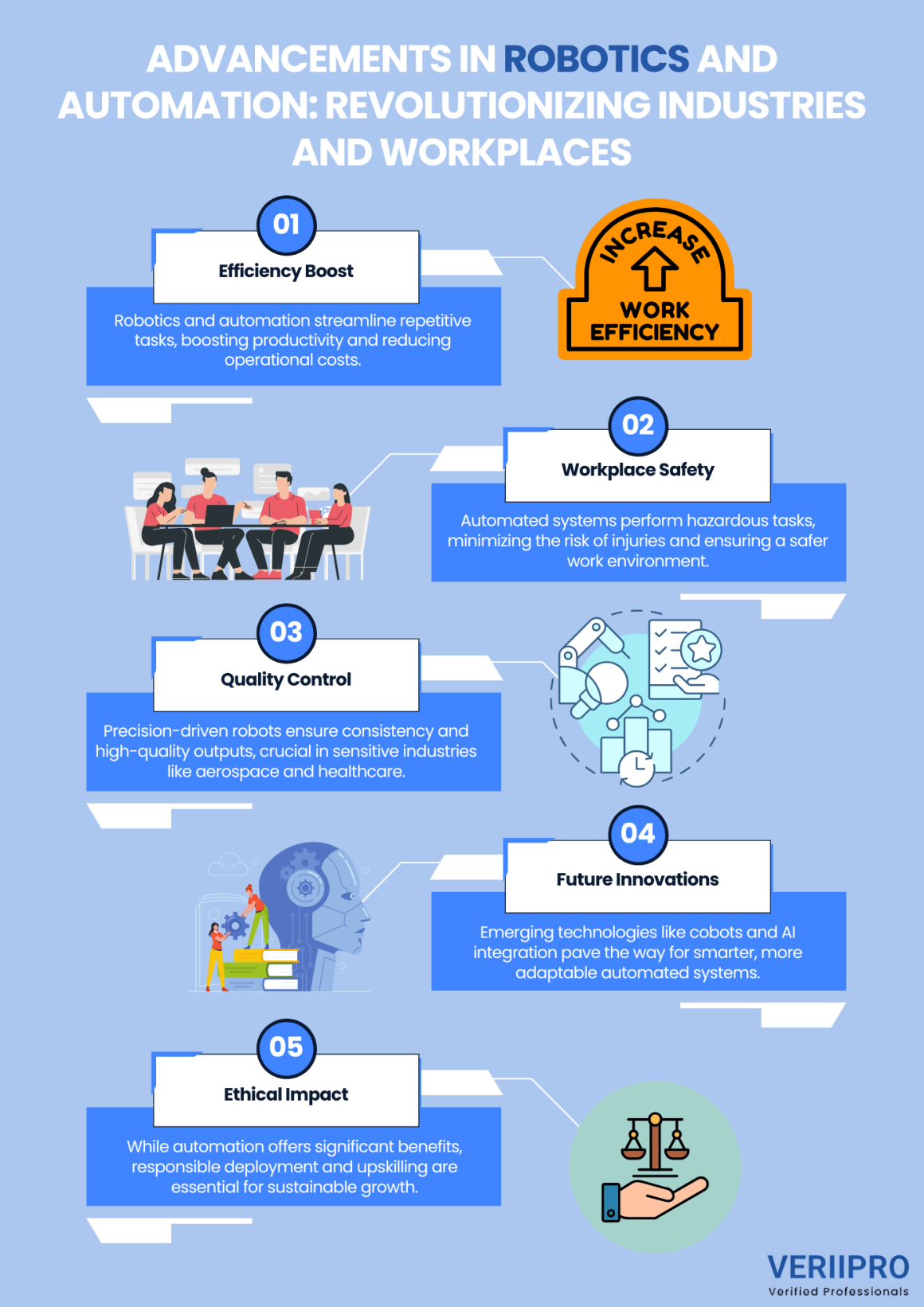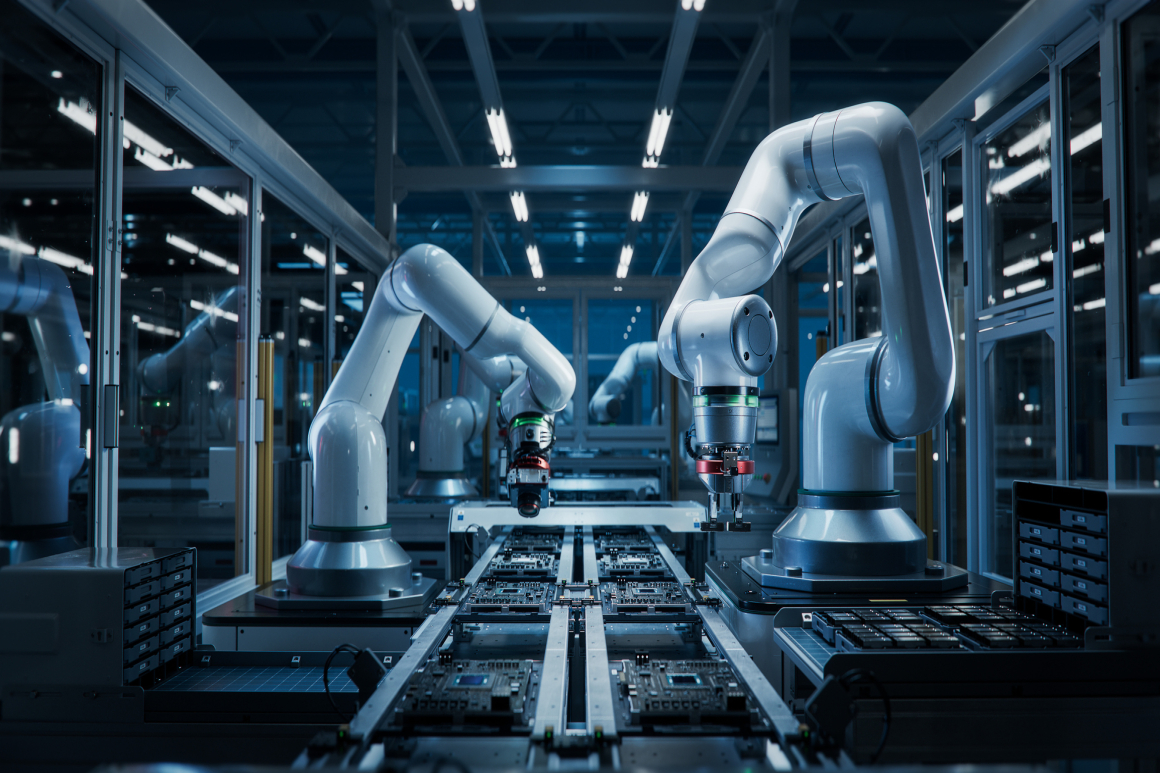Advancements in Robotics and Automation: Revolutionizing Industries and Workplaces
In today’s fast-paced world, robotics and automation are driving a revolution that touches every aspect of our daily lives. These cutting-edge technologies are not only reshaping how businesses operate but are also redefining workplace dynamics across various industries. By automating repetitive tasks, increasing efficiency, and enhancing safety, robotics and automation are laying the groundwork for a future where human creativity and technology work in perfect harmony.

The Evolution of Robotics and Automation
The journey of robotics began with simple, mechanized systems used in manufacturing. Early automation solutions focused on repetitive tasks in industrial settings. Over time, advancements in artificial intelligence and machine learning have led to the development of sophisticated robots capable of performing complex operations. Today’s robots are not limited to assembly lines; they play key roles in sectors such as healthcare, logistics, and even customer service. According to a Forbes report, companies that embrace automation enjoy reduced operational costs and improved product consistency.
Impact on Industries
Robotics and automation have transformed industries by streamlining processes and reducing human error. In manufacturing, robots execute precision tasks that require high levels of accuracy, leading to dramatic improvements in efficiency. In the healthcare sector, automated systems and robotic surgery are revolutionizing patient care by enabling minimally invasive procedures and faster recovery times. Additionally, in logistics and warehousing, autonomous systems manage inventory and streamline distribution networks, ensuring products reach consumers more reliably. The transportation industry is also undergoing a transformation with the advent of autonomous vehicles and drones, paving the way for safer and more efficient travel methods.
Enhancing Productivity and Efficiency
Robotics and automation significantly boost productivity by handling tasks that are too tedious or dangerous for humans. Automated systems can operate 24/7 without fatigue, leading to increased output and consistent performance. For example, in manufacturing, robotics have been shown to increase production efficiency by up to 40%, allowing human workers to focus on creative and strategic tasks. Many companies integrate automated systems with digital platforms to create interconnected networks that deliver real-time insights and facilitate quicker decision-making.
Improving Workplace Safety and Quality
One of the most notable benefits of robotics is the significant enhancement in workplace safety. By taking on hazardous tasks, robots reduce the risk of injuries—a priority emphasized by OSHA. In environments where exposure to dangerous machinery or toxic substances is common, automation provides a crucial protective barrier for human workers. In addition to safety, automated quality control systems help detect and correct errors in real time, ensuring that products meet strict standards, particularly in sensitive industries like aerospace and pharmaceuticals.
Future Innovations and Trends
The future of robotics and automation looks exceptionally promising as technology continues to evolve. Collaborative robots (or cobots) are emerging as a new class of systems designed to work safely alongside human employees. These robots, equipped with advanced sensors and intuitive interfaces, adapt seamlessly to dynamic work environments. The integration of artificial intelligence is unlocking even more possibilities by enabling robots to learn from their surroundings and predict maintenance needs. Additionally, emerging trends such as the Internet of Things (IoT) and edge computing are facilitating real-time data analysis, further accelerating digital transformation and efficiency across industries.
Ethical Considerations and Workforce Impact
While robotics and automation bring numerous benefits, they also raise important ethical and workforce-related questions. The potential for job displacement is a major concern as machines increasingly handle routine tasks. However, many experts argue that automation will also create new roles that require human ingenuity and strategic thinking. Companies are addressing these challenges by investing in ethical frameworks and regulatory compliance measures to ensure responsible deployment and use of automated systems, thereby building trust among consumers and employees alike.
Final Thoughts
Advancements in robotics and automation are undeniably transforming industries and reshaping workplaces. From increased productivity and enhanced safety to higher quality outputs and future-ready innovations, the benefits of these technologies are far-reaching. The synergy between human ingenuity and automated precision is driving unprecedented growth and efficiency in today’s digital landscape. Looking for opportunities in robotics and automation? VeriiPro is here to help!









